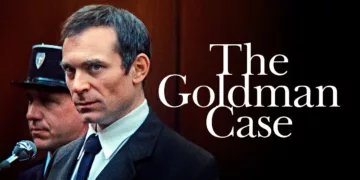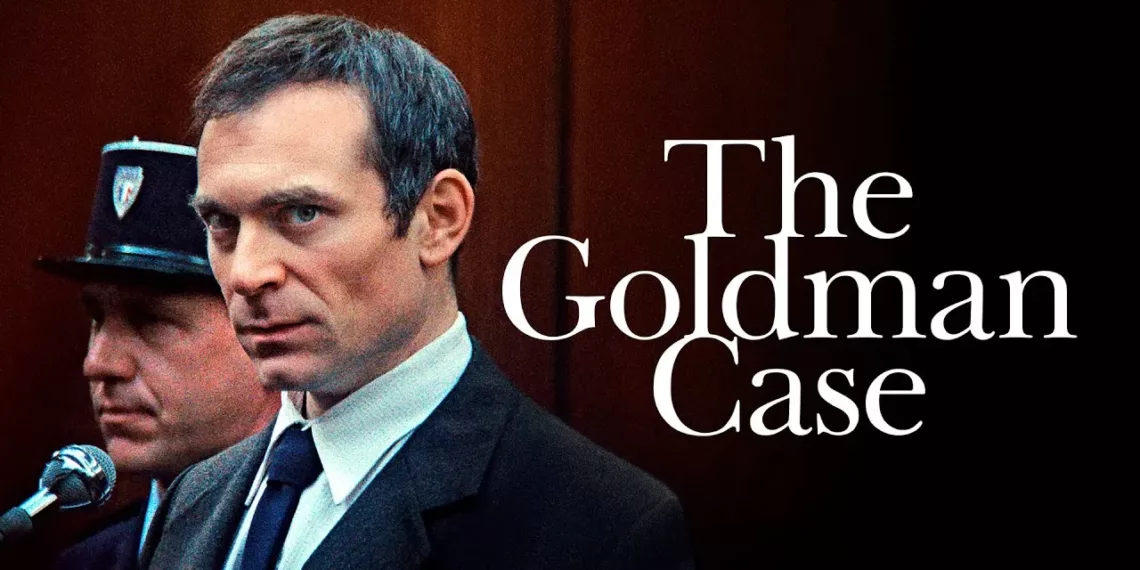The courtroom erupts as Pierre Goldman takes the stand, shaking his shaggy mane. Towering crowds cheer each provocation toward the scowling officers across the aisle. This is not the American legal drama viewers expect; it’s the tumult of real 1970s France. The Goldman Case from director Cédric Kahn captures it all in piercing detail.
Based on a true 1976 appeal, the film centers on enigmatic activist Pierre Goldman. In a previous trial, he’d admitted armed robberies but denied killing two in a pharmacy heist. Now on retrial, Goldman’s past surfaces. The son of Polish refugees, he fought with revolutionaries abroad before becoming a criminal in Paris. But is he a killer?
Kahn plunges us straight into tense proceedings. Goldman continuously unsettles his attorney with changing demands. The defense chips away at bias in eyewitness testimony, as Goldman sparks outrage against purported racism in the force. Interpreting records and interviews, Kahn frames the man’s trial as both a legal battle and a display of the left’s grievances with an unchanging system.
In a confined courtroom setting, the film probes notions of justice, prejudice, and citizenship through piercing dialogue. A magnetic Arieh Worthalter brings Goldman alive—erratic yet eloquent, exposing cracks in the foundations we assume courts are built upon. The Radical on Trial grips as it questions whether any system can fulfill the lofty roles it assigns itself when shaped by human failings.
The Trial Room Theatre
This story is strictly confined to the walls of the courtroom. Cédric Kahn’s film depicts Goldman’s 1976 appeal, nearly the entire duration within that single space. We first enter the setting through Georges Kiejman’s office, where tensions between lawyer and client flare. From here, it’s straight into the legal action.
The trial scene establishes crucial context. Goldman had been convicted years prior of several robberies, one resulting in death. While admitting the robberies, he denied involvement in the killing. Now in retrial, testimony and evidence were reexamined under an engaged public eye.
Kahn sticks scrupulously to reconstructing actual events, piecing the narrative from interviews and archival material. We observe proceedings unfold as before, from witness statements to argument exchanges. Through this straightforward method, different sides of the complex case emerge for consideration.
The tight courtroom frame proves an ingenious choice. Confined to this room, focus homes in on the dialogue driving Haciadelante and Atrás Goldman’s fate. As perspectives litigate, subtle shadings emerge. The very structure spotlights nuanced revelation over hurried pronouncements.
It’s a setting rife with drama despite visual simplicity. Tensions mount as pieces fall into and out of places under interrogation. Opinions clash while judgment hovers. All the while, humanity’s flaws—from forgetfulness to prejudice—creep forth, forcing reflection on justice’s high ideals and cold realities. In this theater of legal strife, director Kahn excavates deeper strata of a man and nation.
The Visuals of Truth
Cédric Kahn crafted his film with a documentary-like approach. There’s no musical score, just the rawness of real courtroom exchanges. His camerawork and editing keep viewers laser-focused on each character’s words.
The setting itself aids this effort. The confined space of the courtroom, with its brown walls and tones, sinks us straight into tense proceedings. We feel enclosed in that singular scene alongside the participants. Khahn lights the space to heighten each subtle gesture and facial expression under interrogation.
Through it all, Kahn guides us without intruding. His camera simply captures each dramatic moment as it unfolds. We view passionate testimony directly, free from external interpretation. Scenes where the witnesses are picked apart feel genuinely tense.
We watch Goldman fire back at accusers amid rising commotion. His lawyer chips diligently away at flaws in eyewitness accounts. Yet the director inserts no dramatic music. His filming lets real emotion and the conflict of perspectives shine through unaided.
By keeping presentation minimal, Kahn underscores how appearances can mislead within the legal system. We view disparities between people’s recollections and the facts up close. His visuals foreground the humanity and biases underneath any court’s clinical facade. The result provokes us to question the mechanisms of justice for ourselves.
The Defiant Defendant
From first sight, Arieh Worthalter sinks into the enigmatic Pierre Goldman. Fiery and volatile, this man remains an bundle of contradictions. Yet Worthalter ensures we grasp Goldman’s core—his staunch defiance of the charges against him.
He portrays a figure brimming with passions, leaping between cold calculation and luminous oration. One moment Goldman silently boils, and the next he commands the courtroom’s rapt attention. Worthalter conveys it all masterfully. By the time he speaks, we share his assured belief in his own innocence.
His performances pack the courtroom, lighting up proceedings. Whether sparring with the stone-faced lawyers or firing back at accusers, Worthalter imbues Goldman with mesmerizing charisma. We watch spellbound as this radical articulates grievances against authority with eloquent rage.
Yet for all his fiery outbursts, riddles remain within Goldman the man. Worthalter leaves some walls intact, hinting at internal contradictions we cannot unravel. He ensures our suspect stays unpredictable to the end—as enigmatic off screen as in life.
This is no caricature, just a living, breathing man subjected to scrutiny. Through Worthalter, Cédric Kahn uncovers the human behind the headlines. We view tensions tear at Goldman within that pressurized setting. The film depends on no score since its star pumps sufficient thrill into every moment.
Worthalter delivers the dynamism that anchors and propels the narrative. His tremendous performance illuminates one individual while shining light on the deeper forces bent on defining him. The Defiant Defendant commands our empathy, keeping us riveted as justice runs its course.
Persistent Prejudices
This film pins its lens on biases lingering within justice systems. Through testimony, it picks at weaknesses in witness accounts, uncovering inconsistencies that question the foundations of some conclusions.
We watch Goldman vigorously counter accusations, appealing his conviction while openly admitting lesser charges. Yet his defense centers on the lack of evidence directly connecting him to murders. Peeling back layers, testimony hints at prejudices against him as a Jew.
Again and again, Goldman loudly denounces the racism he says French police actively display towards himself as well as Black compatriots. Scenes show witnesses swayed by preconceptions of his appearance alone.
Such discrimination persists when people claim no prejudice but evidently behave otherwise. Parallels emerge between the treatment of Jews and blacks in this setting, with neither group escaping slanted eyes. The spotlight on these similarities feels uncomfortably relevant.
These examples stir reflection on whether any legal system, dependent as it is on human beings and their fallibilities, can truly embody lofty principles of equality, fairness, and justice. When handling criminal cases, might decision-making always harbor some prejudice?
By framing Goldman’s trial as a prism to view such important issues, the film achieves profound commentary on flaws continually plaguing institutions. It demonstrates how court cases often represent much more than the individual defendants involved.
The Radical’s Resonant Case
Through its interrogation of Pierre Goldman’s legal battle, The Goldman Case unpacks knotty questions around justice and human biases. Cédric Kahn’s film scrutinizes this complex figure while shining light on deeper societal issues.
Arieh Worthalter anchors the piece, inhabiting Goldman with thrilling dynamism. His towering performance ensures our suspect remains an enigma, yet compels our empathy. Through Worthalter, viewers grasp this politically charged defendant as a full person, not a caricature.
Confined narrowly to the courtroom setting, the film probes notions of fairness, prejudice, and citizenship through piercing dialogue. It screens flaws, continually plaguing institutions that purport objectivity and equality. And it does so in a riveting, thought-provoking manner befitting the arthouse form.
By framing one man’s trial as both a personal fight and an indictment of wider ills, director Kahn attains profound reflection. While profiling an individual case, the piece achieves insights larger than any single outcome. Its examination of justice, identity, and society through a still-resonant radical’s legal defense demands consideration.
The Review
The Goldman Case
Cédric Kahn's The Goldman Case grips as a taut legal thriller but proves far more than mere courtroom drama. Through a riveting showcase of Arieh Worthalter's talents, it holds a mirror to societal prejudices with unsettling resonance. Confined closely to its subject's high-stakes trial, the film unpacks complex issues of justice, identity, and the human frailties that undermine even lofty principles. While profiling one man, Kahn's work attains profundity by interrogating the foundations we assume our structures are built upon.
PROS
- Tightly crafted legal thriller with compelling courtroom scenes
- Arieh Worthalter delivers intense, mesmerizing lead performance.
- Examines universal themes of justice, prejudice, and societal change.
- Provides a profound psychological profile of enigmatic radical Goldman
- Stimulates reflection on how biases undermine principles of fairness
CONS
- Story limited by sole focus on trial without exploring Goldman's full life
- Director could delve deeper into ideas raised rather than fizzle them out.
- Relies on familiar legal drama tropes for mainstream appeal at points





















































Discussion about this post